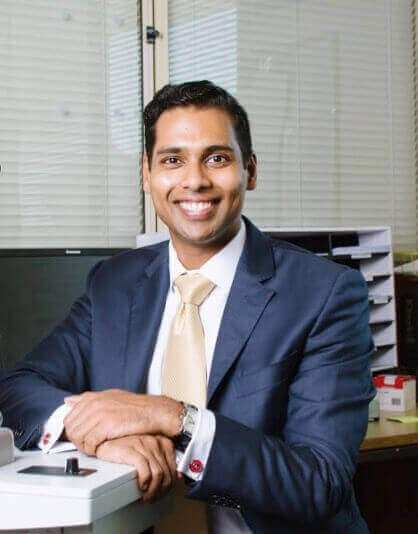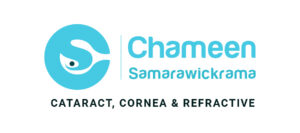About Me
Prof Samarawickrama specialises in cataract surgery with the insertion of premium intraocular lenses (including multifocal lenses and extended depth of focus lenses), keratoconus, Fuchs’ endothelial dystrophy and corneal blindness requiring corneal transplantation. He also performs clear lens extraction, inserts Implantable Collamer Lenses (ICLs) and conducts laser vision correction to help patients enjoy vision without glasses.
Professional Skills and Philosophy
Prof Samarawickrama regularly consults and operates on conditions such as cataract. He specialises in the insertion of premium intraocular lenses (including multifocal lenses and extended depth of focus lenses), keratoconus, Fuchs’ endothelial dystrophy and corneal blindness requiring corneal transplantation. He also performs clear lens extraction, inserts Implantable Collamer Lenses (ICLs) and conducts laser vision correction to help patients enjoy vision without glasses.
Prof Samarawickrama combines scientific excellence with personalised care. He prides himself on clear communication and patient education. His philosophy is to maintain a holistic approach to each person’s vision, from assessment to surgery and aftercare. Prof Samarawickrama always stays up to date with the latest ophthalmic developments and technology.
Education and Early Career
Prof. Samarawickrama is an alumnus of James Ruse Agricultural High School, where he graduated as Dux with a perfect score of 100.00 in the NSW Higher School Certificate. He subsequently studied Medicine and Surgery at the University of New South Wales. After submitting his PhD, Prof. Samarawickrama commenced his ophthalmology training at Sydney Eye Hospital in 2010 and completed his first advanced specialization in cataract, cornea, and laser eye surgery at the Royal Victorian Eye and Ear Hospital in Melbourne.
Prof. Samarawickrama obtained his PhD from the University of Sydney and undertook two international fellowships in cornea, complex cataract, and refractive surgery. He was awarded 2019 ABC Australia’s “Top 5” Young Scientists and is currently an Associate Professor in Clinical Ophthalmology and Eye Health at the University of Sydney and Head of the Cornea Unit at Westmead Hospital. Prof. Samarawickrama has made significant contributions to ophthalmology research, with over 70 peer-reviewed publications and more than $1. 7 million in research funding.
He also holds two international patents, has written several book chapters on innovation in corneal surgery, and is fully committed to mentoring, having supervised many PhD, MPhil, and Honours students in clinical and basic science research disciplines.

Achievements and Credentials
Prof Samarawickrama was named one of the ‘Top 5’ Young Scientists of 2019 and is currently a National Health and Medical Research Council (NHMRC) Investigator Fellow, an award given to the top 2% of research leaders in the field. He has made significant contributions to ophthalmology research and is a leading clinician-scientist.
Prof Samarawickrama has authored over 70 publications in top-tier international journals, obtained over ten highly acclaimed scholarships, and awarded and administered over $1.7 million in research funding.
In 2020 he established a research group, the Translational Ophthalmic Research and Immunology Consortium (TORIC), based in the Westmead Research Hub, where he leads a dedicated team of researchers and students to understand and explore the molecular and immunological processes driving corneal diseases. He currently supervises 4 PhD students, 2 Masters students and 2 Honours students.
An Innovator of Technologies
Prof Samarawickrama has been at the forefront of developing new technologies. Not only does he improve lives by using his surgical skills in ophthalmology, but he also utilises his knowledge and understanding of the basic sciences of the cornea to develop new technology. He was instrumental in designing and developing a corneal glue, which is used to seal corneal perforations. He also designed and created a specialised corneal trephine used in the newest type of corneal transplantation known as Descemet’s Membrane Endothelial Keratoplasty (DMEK). Both of his inventions are being commercialised for use in the global market.
Prof Samarawickrama is a regular speaker at international and national conferences. He trains and instructs ophthalmology trainees in cataract surgery, corneal transplantation and anterior segment reconstructions.

Personal Life
Prof Samarawickrama lives in Sydney with his wife, a local GP, and three young children. In his spare time, he is an avid squash player and loves a good book.
